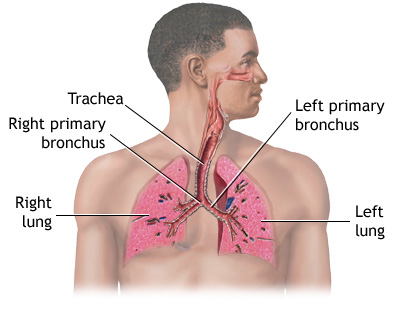Respiratory failure
Respiratory failure happens when not enough oxygen passes from your lungs into your blood. Your body's organs, such as your heart and brain, need oxygen-rich blood to work well. Respiratory failure also can happen if your lungs can't remove carbon dioxide (a waste gas) from your blood. Too much carbon dioxide in your blood can harm your body's organs.

Air is breathed in through the nasal passageways, travels through the trachea and bronchi to the lungs.
Diseases and conditions that affect your breathing can cause respiratory failure. Examples include
- Lung diseases such as COPD (chronic obstructive pulmonary disease), pneumonia, pulmonary embolism, and cystic fibrosis
- Conditions that affect the nerves and muscles that control breathing, such as spinal cord injuries, muscular dystrophy and stroke
- Damage to the tissues and ribs around the lungs. An injury to the chest can cause this damage.
- Drug or alcohol overdose
- Injuries from inhaling smoke or harmful fumes
Treatment for respiratory failure depends on whether the condition is acute (short-term) or chronic (ongoing) and how severe it is. It also depends on the underlying cause. You may receive oxygen therapy and other treatment to help you breathe.
Source: http://www.nlm.nih.gov/medlineplus/respiratoryfailure.html

